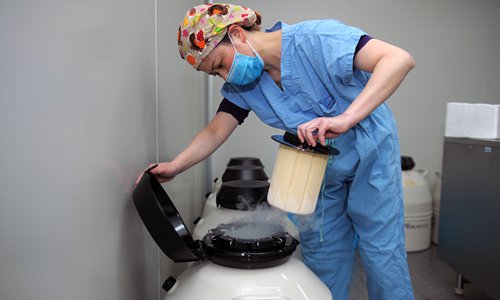
A doctor opens a liquid nitrogen storage container for sperm or eggs at the assisted reproductive medicine center of Sichuan Provincial People’s Hospital in the southwestern city of Chengdu. Photo: VCG
Proposals calling for the provision of policy guarantees and social support for women's benefits, especially those related to birth, in China's ongoing 2020 two sessions, have sparked concerns on the Chinese internet, as China's natural population growth has dropped for three years in a row.
A proposal calling for a ban on unmarried women freezing their eggs in order to "encourage citizens to get married and give birth at a proper age" has triggered great debate on the internet. On Monday night, it became the most trending topic on Sina Weibo, one of China's largest social media platforms. As of press time, the topic had garnered 690 million views.
The proposal was put forward by Sun Wei, an NPC deputy from East China's Shandong Province and a doctor in reproductive medicine. She said that the process of egg freezing, unlike sperm freezing, might be dangerous.
Also, according to current law in China, freezing eggs is part of assisted reproductive technology, which is not designed for unmarried women to postpone giving birth, Shanghai-based news website thepaper.cn reported.
Sun noted that if egg freezing were opened to the public without careful consideration, there would be a waste of resources, and even the possibility of an illegal egg trade and surrogacy.
"It's understandable that the country should think about the future. But one wants to live a good life of her own usually," one netizen said.
"Why can men freeze their sperm, but women cannot do that to their eggs? Unfair," another doubted.
Meanwhile, Peng Jing, a member of the Chinese People's Political Consultative Conference (CPPCC) National Committee, proposed to endorse assisted reproductive rights for unmarried women, such as allowing them to freeze their eggs, media reported Thursday.
Peng, a partner of the Chongqing Jingsheng Law Firm, said that the current situation has given rise to illegal operations of assisted reproductive methods, where single women seek help from underground hospitals, or go abroad for operations.
Peng drew public attention to herself in an interview over the weekend saying that "I suggest so-called feminism should not be emphasized on purpose. It is enough to achieve gender equality."
Debate over feminism has been heated recently on the Chinese internet. During the two sessions of the year, other proposals favoring birth have caused lively back and forth with some netizens stressing that women might be trapped in family life at the expense of their benefits, while others refute that notion.
Fang Yan, an NPC deputy, proposed the inclusion of postpartum depression in medical insurance in China, which would cover fees for psychological assessment, treatment, and recovery. Women could ask for compensation from their husbands due to postpartum depression from their divorce.
On this, the deputy called for further expansion of the Law on the Protection of Rights and Interests of Women.
Xiong Sidong, principal of Suzhou University and an NPC deputy, suggested increasing men's paternity leave to 38 days so that they could better take care of mothers and newborn babies.
Li Mengjiao, a CPPCC member, proposed to increase public kindergartens' capability of accepting toddlers under three years old. She said that toddlers being unable to enter kindergarten is a main reason that China's two-children policy has not been warmly received in the past.
In 2019, China had 14.65 million newborn babies, extending a decline to three consecutive years.
China's natural population growth rate has dropped to 0.334 percent, lower than most countries in the word. "If the kindergarten enrollment problem could be solved, population growth could increase by 10 percentage point," she said.
"Women's rights and family life are not in contrast. Now there are problems in women's rights and benefits, which should be improved by related proposals," Luo Ruixue, a member of Guangzhou-based women's rights protection group Women Awakening Network, told the Global Times on Monday.
Luo noted that in China's current context, the word feminism is complicated. "But there are no extra rights, because rights come naturally at birth," she said. "Peng Jing said she would not put emphasis on feminism, but she might have been seizing benefits for women."
Luo believed recent concerns on women's rights signals progress is being made in public education and people's awakening on rights. "People's sensitivity on sex discrimination has improved."

